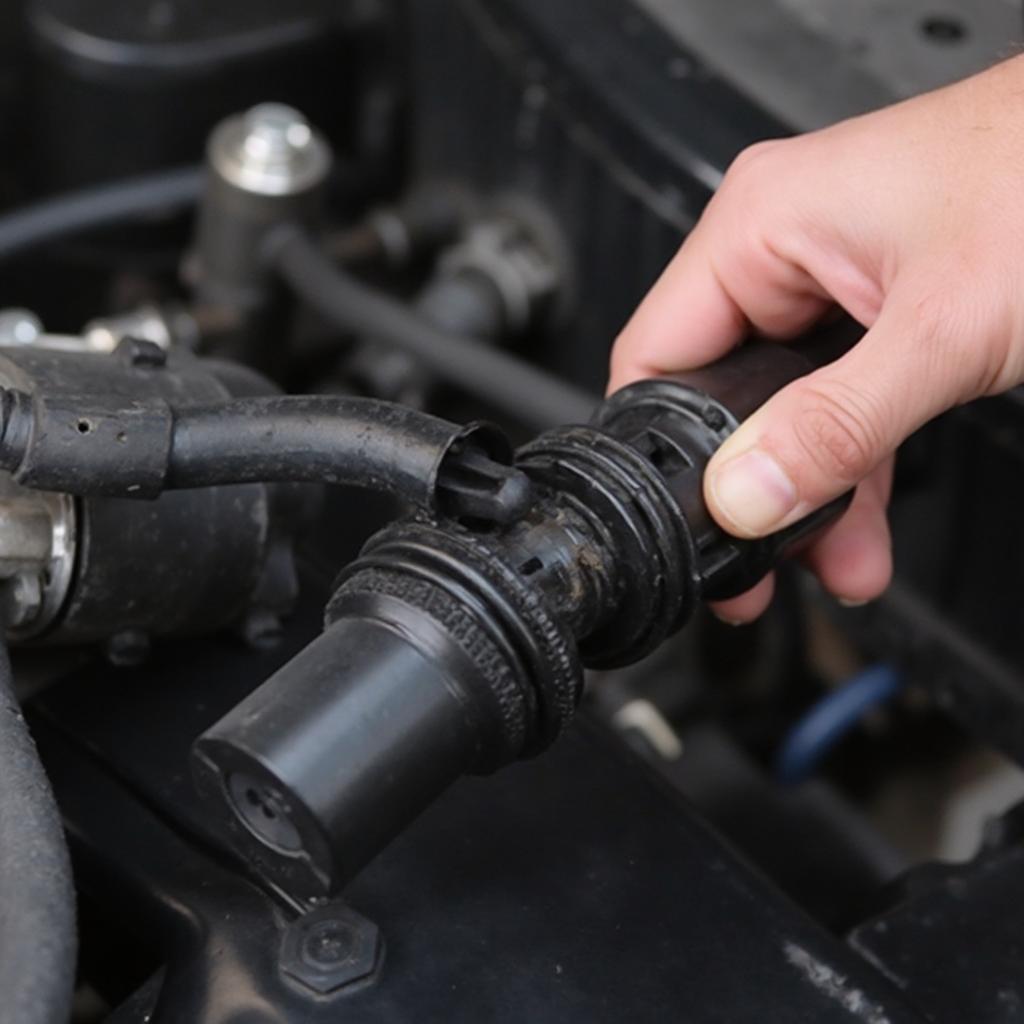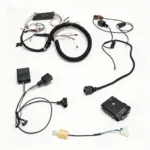You’ve just replaced your fuel filter, hoping for a smoother ride, but now a pesky check engine light is staring you in the face. Can changing a fuel filter trigger an OBD2 code? The answer, surprisingly, is yes, although it’s not the filter itself that’s usually the culprit. Let’s dive into the reasons why this might happen and how to troubleshoot the issue.
Understanding the Connection Between Fuel Filters and OBD2 Codes
A fuel filter’s primary job is to prevent contaminants from reaching your engine. While changing it is essential maintenance, the process itself can sometimes disturb other components or reveal underlying problems that trigger a diagnostic trouble code (DTC), better known as an OBD2 code. It’s important to understand that the new fuel filter isn’t causing the code directly; rather, the act of replacing it might have exposed a pre-existing issue or created a new one.
Common Reasons for OBD2 Codes After a Fuel Filter Change
Several factors can contribute to an OBD2 code appearing after a fuel filter change:
- Loose Connections: One of the most common culprits is a loose or improperly connected fuel line. When replacing the filter, it’s easy to accidentally loosen a connection, which can cause a fuel pressure drop and trigger a code.
- Damaged Wiring: The wiring near the fuel filter can sometimes be brittle or damaged. Replacing the filter might further disturb this wiring, leading to a short circuit or open circuit, which can trigger a code related to the fuel system or other electrical components.
- Faulty Fuel Pump: A failing fuel pump might struggle to maintain pressure, especially after a filter change. The new, clean filter can sometimes highlight a pre-existing weakness in the pump, causing it to work harder and potentially trigger a code.
- Contaminated Fuel System: If your fuel system was heavily contaminated before the filter change, some debris might have dislodged during the process and moved further down the line, potentially affecting fuel injectors or other sensitive components.
- Resetting the ECU: In some cases, disconnecting the battery or otherwise resetting the engine control unit (ECU) during the filter change can temporarily trigger codes related to fuel system parameters. These codes often clear themselves after a few driving cycles.
How to Diagnose and Fix the Issue
If you encounter an OBD2 code after changing your fuel filter, don’t panic. Here’s a step-by-step guide to help you diagnose and resolve the problem:
- Read the Code: Use an OBD2 scanner to retrieve the specific code. This will give you a starting point for your diagnosis.
- Check for Loose Connections: Carefully inspect all fuel lines and connections around the filter. Ensure they are properly tightened and secure.
- Inspect Wiring: Examine the wiring near the fuel filter for any signs of damage, such as fraying, cracks, or exposed wires.
- Check Fuel Pressure: Use a fuel pressure gauge to test the fuel pressure. This will help determine if the fuel pump is functioning correctly.
- Consult a Mechanic: If you’re unsure about any step or the code persists, it’s always best to consult a qualified mechanic.
Can a Clogged Fuel Filter Cause an OBD2 Code?
While a severely clogged fuel filter can negatively impact engine performance, it doesn’t always directly trigger an OBD2 code. However, the strain on the fuel system caused by a clogged filter can exacerbate other issues, potentially leading to codes related to fuel pressure or misfires.
Expert Insight
“I often see drivers neglecting their fuel filters until they cause noticeable performance problems,” says John Smith, ASE Certified Master Technician. “While a clogged filter might not directly throw a code, it can put undue stress on the fuel pump and other components, eventually leading to more serious issues and diagnostic trouble codes.”
Preventing OBD2 Codes After a Fuel Filter Change
Taking a few precautions can minimize the risk of encountering OBD2 codes after changing your fuel filter:
- Consult your vehicle’s service manual: Follow the manufacturer’s recommended procedures for fuel filter replacement.
- Use quality parts: Choose a high-quality fuel filter that meets or exceeds OEM specifications.
- Be gentle with wiring: Carefully handle the wiring and connections around the fuel filter to avoid damage.
- Double-check your work: After replacing the filter, thoroughly inspect all connections and ensure they are secure.
Conclusion
While changing a fuel filter itself doesn’t directly cause OBD2 codes, the process can sometimes uncover underlying issues or create new ones due to loose connections, damaged wiring, or other factors. By understanding these potential problems and following proper diagnostic procedures, you can quickly resolve any codes that appear after a fuel filter change and get back on the road with confidence. Remember, regular maintenance and using quality parts are key to keeping your vehicle running smoothly.
FAQ
- Can a new fuel filter cause a check engine light? Indirectly, yes. The process of changing the filter can sometimes disturb other components, leading to a code.
- How do I know if my fuel filter needs to be replaced? Signs of a clogged filter include difficulty starting, rough idling, and reduced engine power.
- What does a fuel filter do? It removes contaminants from the fuel before it reaches the engine, protecting sensitive components.
- How often should I change my fuel filter? Consult your vehicle’s service manual for the recommended interval.
- Can I change my fuel filter myself? Yes, in many vehicles, it’s a relatively simple DIY task.
- What’s the difference between an OBD1 and OBD2 scanner? OBD2 is a newer, standardized system that provides more detailed diagnostic information.
- Where can I find more information about OBD2 codes? The OBDFree website offers extensive resources and articles on OBD2 codes and troubleshooting.
Related Topics You Might Find Helpful on OBDFree:
- Understanding OBD2 Codes
- Common Fuel System Problems
- DIY Car Maintenance Tips
- Choosing the Right OBD2 Scanner
Need further assistance? Contact our 24/7 customer support team via WhatsApp: +1(641)206-8880 or Email: [email protected]. We’re here to help!


